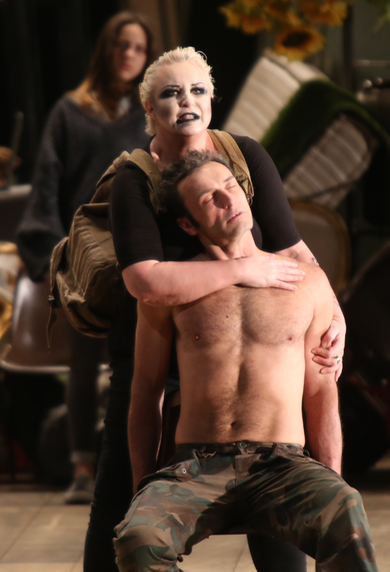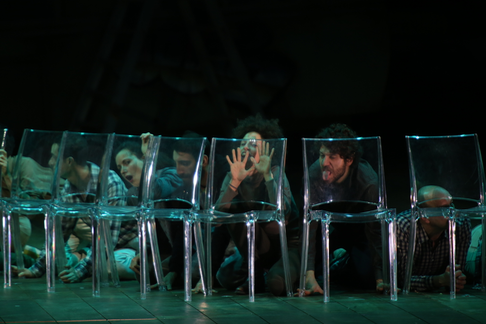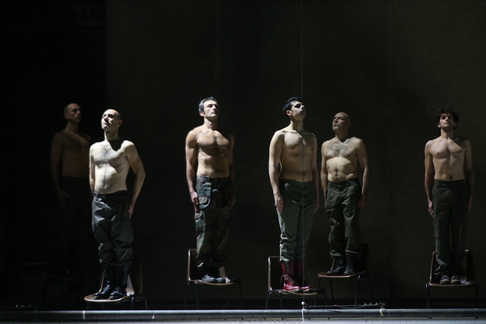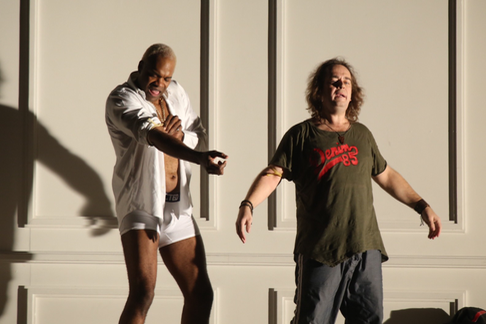
08 Feb 2016
Götterdämmerung in Palermo
There are not many opera productions that you would cross oceans to see. Graham Vick’s Götterdämmerung in Sicily however compelled such a voyage.
English Touring Opera are delighted to announce a season of lyric monodramas to tour nationally from October to December. The season features music for solo singer and piano by Argento, Britten, Tippett and Shostakovich with a bold and inventive approach to making opera during social distancing.
This tenth of ten Live from London concerts was in fact a recorded live performance from California. It was no less enjoyable for that, and it was also uplifting to learn that this wasn’t in fact the ‘last’ LfL event that we will be able to enjoy, courtesy of VOCES8 and their fellow vocal ensembles (more below …).
Ever since Wigmore Hall announced their superb series of autumn concerts, all streamed live and available free of charge, I’d been looking forward to this song recital by Ian Bostridge and Imogen Cooper.
The Sixteen continues its exploration of Henry Purcell’s Welcome Songs for Charles II. As with Robert King’s pioneering Purcell series begun over thirty years ago for Hyperion, Harry Christophers is recording two Welcome Songs per disc.
Although Stile Antico’s programme article for their Live from London recital introduced their selection from the many treasures of the English Renaissance in the context of the theological debates and upheavals of the Tudor and Elizabethan years, their performance was more evocative of private chamber music than of public liturgy.
In February this year, Albanian soprano Ermonela Jaho made a highly lauded debut recital at Wigmore Hall - a concert which both celebrated Opera Rara’s 50th anniversary and honoured the career of the Italian soprano Rosina Storchio (1872-1945), the star of verismo who created the title roles in Leoncavallo’s La bohème and Zazà, Mascagni’s Lodoletta and Puccini’s Madama Butterfly.
Evidently, face masks don’t stifle appreciative “Bravo!”s. And, reducing audience numbers doesn’t lower the volume of such acclamations. For, the audience at Wigmore Hall gave soprano Elizabeth Llewellyn and pianist Simon Lepper a greatly deserved warm reception and hearty response following this lunchtime recital of late-Romantic song.
Collapsology. Or, perhaps we should use the French word ‘Collapsologie’ because this is a transdisciplinary idea pretty much advocated by a series of French theorists - and apparently, mostly French theorists. It in essence focuses on the imminent collapse of modern society and all its layers - a series of escalating crises on a global scale: environmental, economic, geopolitical, governmental; the list is extensive.
For this week’s Live from London vocal recital we moved from the home of VOCES8, St Anne and St Agnes in the City of London, to Kings Place, where The Sixteen - who have been associate artists at the venue for some time - presented a programme of music and words bound together by the theme of ‘reflection’.
'Such is your divine Disposation that both you excellently understand, and royally entertaine the Exercise of Musicke.’
Amongst an avalanche of new Mahler recordings appearing at the moment (Das Lied von der Erde seems to be the most favoured, with three) this 1991 Mahler Second from the 2nd Kassel MahlerFest is one of the more interesting releases.
‘And there was war in heaven: Michael and his angels fought against the dragon; and the dragon fought and his angels, And prevailed not; neither was their place found any more in heaven … that old serpent … Satan, which deceiveth the whole world: he was cast out into the earth, and his angels were cast out with him.’
If there is one myth, it seems believed by some people today, that probably needs shattering it is that post-war recordings or performances of Wagner operas were always of exceptional quality. This 1949 Hamburg Tristan und Isolde is one of those recordings - though quite who is to blame for its many problems takes quite some unearthing.
There was never any doubt that the fifth of the twelve Met Stars Live in Concert broadcasts was going to be a palpably intense and vivid event, as well as a musically stunning and theatrically enervating experience.
‘Love’ was the theme for this Live from London performance by Apollo5. Given the complexity and diversity of that human emotion, and Apollo5’s reputation for versatility and diverse repertoire, ranging from Renaissance choral music to jazz, from contemporary classical works to popular song, it was no surprise that their programme spanned 500 years and several musical styles.
The Academy of St Martin in the Fields have titled their autumn series of eight concerts - which are taking place at 5pm and 7.30pm on two Saturdays each month at their home venue in Trafalgar Square, and being filmed for streaming the following Thursday - ‘re:connect’.
The London Symphony Orchestra opened their Autumn 2020 season with a homage to Oliver Knussen, who died at the age of 66 in July 2018. The programme traced a national musical lineage through the twentieth century, from Britten to Knussen, on to Mark-Anthony Turnage, and entwining the LSO and Rattle too.
With the Live from London digital vocal festival entering the second half of the series, the festival’s host, VOCES8, returned to their home at St Annes and St Agnes in the City of London to present a sequence of ‘Choral Dances’ - vocal music inspired by dance, embracing diverse genres from the Renaissance madrigal to swing jazz.
Just a few unison string wriggles from the opening of Mozart’s overture to Le nozze di Figaro are enough to make any opera-lover perch on the edge of their seat, in excited anticipation of the drama in music to come, so there could be no other curtain-raiser for this Gala Concert at the Royal Opera House, the latest instalment from ‘their House’ to ‘our houses’.
"Before the ending of the day, creator of all things, we pray that, with your accustomed mercy, you may watch over us."

There are not many opera productions that you would cross oceans to see. Graham Vick’s Götterdämmerung in Sicily however compelled such a voyage.
Graham Vick deconstructed Wagner’s timeless musical myth of the gods of power and wealth into twenty-first century proportions, propelling Wagner’s nineteenth century, early industrial age to a destiny unimaginable, certainly unacceptable to Romantic idealism. The original catastrophic conclusion Wagner envisioned for the gods was absolutely real then, and perhaps from those final sublime moments of Götterdämmerung our modern social democracies have emerged.
But in Palermo Graham Vick rediscovered and revealed the Wagnerian catastrophe for the post-industrial age, may we say for our post-democracy age. The outcome is devastating and there is no sublimity. But make no mistake, all this unfolds in mythically musical terms that are purely Wagnerian.
Graham Vick built this concluding episode of Wagner’s epic in Brechtian language. An empty stage, a small green mound, some plastic chairs, a white platform, an Eames chair, a beat-up old caravan plus a huge, broken metal lighting tree that was surely Wotan’s ash tree!
 The Rhine, Act III
The Rhine, Act III
But it was far huger than these few props. The theater itself, its 1358 spectators were enveloped within the action, the foyers echoing with the fanfares, Hagen shouting insults seated in the tenth row, Gunther triumphantly dragging Brünnhilde down the center aisle onto the stage. And finally, in the end, we became aware that we were the Rhine itself, the ring thrown into our flood by the hoard lined across the stage apron, their suicide vests ticking.
Graham Vick totally humanized Wagner’s mythological compendium, Grane was a fine, strong young man with a chair onto which Siegfried mounted. During his orchestral journey to the Rhine the stage became flooded with innumerable strong, beautiful youth who moved with purpose and grace, the mighty Rhine, its mighty spirit. This was the truly sublime moment of the evening.
In the beginning the three norns had been seated at a table, the broken thread were the twigs of the ash tree that became the fuse of the bomb they constructed and placed in the backpack Siegfried picks up. At the end if Brünnhilde and Grane’s immolation was moving it was also equally terrifying as we understood that it was the same suicide that constitutes the final mass suicide image, Wagner’s sweet and beautiful music flooding into the bombers’ broad smiles — it was the ultimate Wagnerian irony.
 The hero horses on Valhalla
The hero horses on Valhalla
The spine tingling moment of the evening was however not the end of the opera, instead it was the visit of the Valkyrie Waltraute who tells Brünnhilde of Wotan’s council with his gods wherein he informs them that he has constructed the pire for Valhalla’s destruction, and that he has sent two ravens to bring news of the world below. Waltraute is elegant, her horse is a handsome young compassionate hero, her entreaties that Brünnhilde sacrifice the ring are maximally eloquent — fifty or so handsome young hero horses are suddenly revealed at rigid, bare chested heroic attention. But her supplications go unheeded thus she mounts her hero horse and disappears. It was the climatic scene of the evening.
Wotan’s ravens do appear in the world below, two black clad mimes in dark glasses who introduce the prelude to the third act. In the end Brünnhilde will dispatch them back to Valhalla. You know the rest.
Graham Vick’s mastery of theatrical languages in no less than astounding. His intuitions of the terrors of our present world and their connections to our artistic past are profound. The images he creates are not simple metaphors but remain rich poetic intuitions to be embraced rather than defined.
Wagner’s score and the individual performances were subsumed into this evening of powerful theater. If conductor Stefan Anton Reck’s tempos at times seemed slow they finally well served the staging. If the winds of the orchestra of the Teatro Massimo could not help bringing inappropriate lyricism to Wagnerian line, the brass and particularly the strings created the continuum that could be beautiful, inspiring and terrifying.
 Eric Greene as Gunther and Christian Voigt as Siegfried becoming brothers
Eric Greene as Gunther and Christian Voigt as Siegfried becoming brothers
Without exception all performances were total. The three norns were of fine voice and fine figure, the Waltraute of elegant, high heeled Romanian mezzo Victoria Vizin, was superb. Swedish bass Mats Almgren created a rough, brutal Hagen and American baritone Eric Green was a beautifully voiced, sensitive and gullible Gunther. Danish soprano Iréne Theorin made Brünnhilde everything you wanted in thrilling Brigid Nilsson style delivery. German tenor Christian Voigt created a Siegfried more by intent than voice, but he did indeed embody a real Siegfried.
Michael Milenski
Cast and production information:
Siegfried: Christian Voigt; Gunther: Eric Greene; Alberich: Sergei Leiferkus; Hagen: Mats Almgren; Brünnhilde: Irene Theorin; Gutrune: Elizabeth Blancke-Biggs; Waltraute; Viktoria Vizin; Erste Norn; Annette Jahns; Zweite Norn/Wellgunde: Christine Knorren; Dritte Norn/Woglinde: Stephanie Corley; Flosshilde: Renée Tatum; Ein Mann: Antonio Barbagallo, Gianfranco Giordano; Ein anderer Mann: Carlo Morgante, Francesco Polizzi. Chorus and Orchestra of the Teatro Massimo. Conductor: Stefan Anton Reck; Metteur en scéne: Graham Vick; Scene and Costume designs: Richard Hudson; Mimic actions: Ron Howell; Light designer: Giuseppe Di Iorio. Teatro Massimo, Palermo, February 2, 2016.